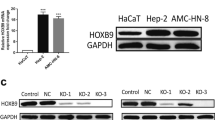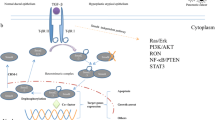Abstract
Background
Esophageal squamous cell carcinoma (ESCC) is an important cause of cancer-related death worldwide. To improve prognoses in patients with ESCC, we evaluated the potential of transforming growth factor-beta-induced protein (TGFBI), which is overexpressed in ESCC, as a therapeutic candidate.
Methods
We examined the clinical significance of TBFBI in 102 ESCC samples using real-time RT-PCR. Immunohistochemical studies were conducted to examine the localization of TGFBI. Knockdown of TGFBI in cocultured fibroblasts was performed to determine the roles of TGFBI in migration and invasion.
Results
The level of TGFBI in ESCC tissues was higher than that in normal tissues. The high TGFBI expression group (n = 16) had higher TGFB1 expression and more frequent hematogenous recurrence than the low-expression group (n = 86). High TGFBI expression was an independent prognostic factor in patients with ESCC. TGFBI was mainly localized in stromal cells of ESCC. Moreover, suppression of TGFBI in fibroblasts inhibited the migration and invasion capacity of TE8 ESCC cells.
Conclusions
High TGFBI expression in ESCC tissues could be a powerful biomarker of poor prognosis and hematogenous recurrence. TGFBI in stromal cells might be a promising molecular target for ESCC treatment.



Similar content being viewed by others
References
Ferlay J, Shin HR, Bray F, et al. Estimates of Worldwide Burden of Cancer in 2008: GLOBOCAN 2008. Int J Cancer. 2010;127:2893–917.
Parkin DM, Bray FI, Devesa SS. Cancer Burden in the Year 2000. The Global Picture. Eur J Cancer. 2001;37 Suppl 8:S4–66.
Wong FH, Huang CY, Su LJ, et al. Combination of Microarray Profiling and Protein-Protein Interaction Databases Delineates the Minimal Discriminators as a Metastasis Network for Esophageal Squamous Cell Carcinoma. Int J Oncol. 2009;34:117–128.
Kawamoto T, Noshiro M, Shen M, et al. Structural and phylogenetic analyses of RGD-CAP/Beta ig-h3, a Fasciclin-like adhesion protein expressed in chick chondrocytes. Biochim Biophys Acta. 1998;1395:288–92.
Schneider D, Kleeff J, Berberat PO, et al. Induction and Expression of Betaig-h3 in Pancreatic Cancer Cells. Biochim Biophys Acta. 2002;1588:1–6.
Nabokikh A, Ilhan A, Bilban M, et al. Reduced TGF-Beta1 expression and its target genes in human insulinomas. Exp Clin Endocrinol Diabetes. 2007;115:674–82.
Buckhaults P, Rago C, St Croix B, et al. Secreted and cell surface genes expressed in benign and malignant colorectal tumors. Cancer Res. 2001;61:6996–7001.
Tomioka H, Morita K, Hasegawa S, Omura K. Gene Expression Analysis by cDNA Microarray in Oral Squamous Cell Carcinoma. J Oral Pathol Med. 2006;35:206–11.
Fujiki K, Nakayasu K, Kanai A. Corneal Dystrophies in Japan. J Hum Genet. 2001;46:431–5.
Han B, Luo H, Raelson J, et al. TGFBI (BetaIG-H3) is a diabetes-risk gene based on mouse and human genetic studies. Hum Mol Genet. 2014; 23:4597–611.
Li B, Wen G, Zhao Y, et al. The role of TGFBI in mesothelioma and breast cancer: association with tumor suppression. BMC Cancer. 2012;12:239.
Wen G, Hong M, Li B, et al. Transforming growth factor-beta-induced protein (TGFBI) suppresses mesothelioma progression through the Akt/mTOR pathway. Int J Oncol. 2011;39:1001–9.
Kang S, Dong SM, Park NH. Frequent promoter hypermethylation of TGFBI in epithelial ovarian cancer. Gynecol Oncol. 2010;118:58–63.
Shah JN, Shao G, Hei TK, Zhao Y. Methylation screening of the TGFBI promoter in human lung and prostate cancer by methylation-specific PCR. BMC Cancer. 2008;8:284.
Caren H, Djos A, Nethander M, et al. Identification of epigenetically regulated genes that predict patient outcome in neuroblastoma. BMC Cancer. 2011;11:66.
Ahmed AA, Mills AD, Ibrahim AE, et al. The extracellular matrix protein TGFBI induces microtubule stabilization and sensitizes ovarian cancers to Paclitaxel. Cancer Cell. 2007;12:514–27.
Ma C, Rong Y, Radiloff DR, et al. Extracellular matrix protein Betaig-h3/TGFBI promotes metastasis of colon cancer by enhancing cell extravasation. Genes Dev. 2008;22:308–21.
Lebdai S, Verhoest G, Parikh H, et al. Identification and validation of TGFBI as a promising prognosis marker of clear cell renal cell carcinoma. Urol Oncol. 2014. doi:10.1016/j.urolonc.2014.06.005
Skonier J, Neubauer M, Madisen L, et al. cDNA cloning and sequence analysis of Beta ig-h3, a novel gene induced in a human adenocarcinoma cell line after treatment with transforming growth factor-Beta. DNA Cell Biol. 1992;11:511–22.
Ivanov SV, Ivanova AV, Salnikow K, et al. Two novel VHL targets, TGFBI (BIGH3) and its transactivator KLF10, are up-regulated in renal clear cell carcinoma and other tumors. Biochem Biophys Res Commun. 2008;370:536–40.
Montorfano I, Becerra A, Cerro R, et al. Oxidative stress mediates the conversion of endothelial cells into myofibroblasts via a TGF-Beta1 and TGF-Beta2-dependent pathway. Lab Invest 2014;94:1068–1082.
Costa A, Scholer-Dahirel A, Mechta-Grigoriou F. The role of reactive oxygen species and metabolism on cancer cells and their microenvironment. Sem Cancer Biol. 2014;25:23–32.
Ween MP, Oehler MK, Ricciardelli C. Transforming growth factor-beta-induced protein (TGFBI)/(Betaig-H3): a matrix protein with dual functions in ovarian cancer. Int J Mol Sci. 2012;13:10461–77.
Jiang SS, Huang SF, Huang MS, et al. Dysregulation of the TGFBI gene is involved in the oncogenic activity of the nonsense mutation of hepatitis B virus surface gene sW182*. Biochim Biophys Acta. 2014;1842:1080–7.
Son HN, Nam JO, Kim S, Kim IS. Multiple FAS1 domains and the RGD motif of TGFBI act cooperatively to bind alphavbeta3 integrin, leading to anti-angiogenic and anti-tumor effects. Biochim Biophys Acta. 2013;1833:2378–88.
Lauden L, Siewiera J, Boukouaci W, et al. TGF-beta-induced (TGFBI) protein in melanoma: a signature of high metastatic potential. J Invest Dermatol. 2014;134:1675–85.
Klein CA. Cancer. The metastasis cascade. Science. 2008;321:1785–7.
Buga AM, Margaritescu C, Scholz CJ, et al. Transcriptomics of post-stroke angiogenesis in the aged brain. Front Again Neurosci. 2014;6:44.
Acknowledgment
The authors thank Ms. Yukie Saito, Ms. Tomoko Yano, Ms. Yuka Matsui, Ms. Ayaka Ishida, and Ms. Ayaka Ishikubo for their assistance. This work was supported in part by Grants-in-Aid for Scientific Research from the Japan Society for the Promotion of Science (JSPS), Grant Numbers 21591690, 22591450, and 23591857.
Author information
Authors and Affiliations
Corresponding author
Electronic supplementary material
Below is the link to the electronic supplementary material.
Rights and permissions
About this article
Cite this article
Ozawa, D., Yokobori, T., Sohda, M. et al. TGFBI Expression in Cancer Stromal Cells is Associated with Poor Prognosis and Hematogenous Recurrence in Esophageal Squamous Cell Carcinoma. Ann Surg Oncol 23, 282–289 (2016). https://doi.org/10.1245/s10434-014-4259-4
Received:
Published:
Issue Date:
DOI: https://doi.org/10.1245/s10434-014-4259-4




